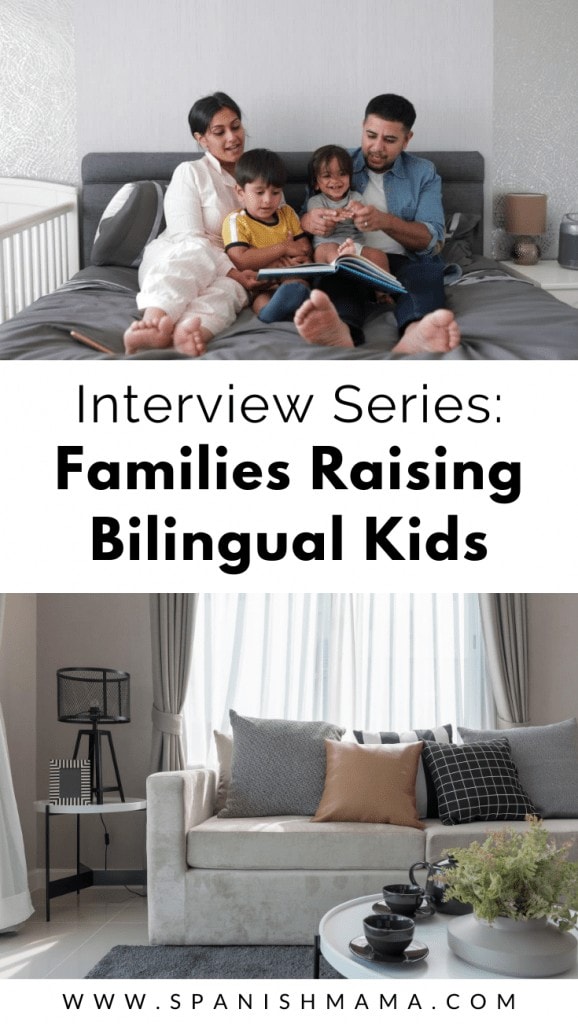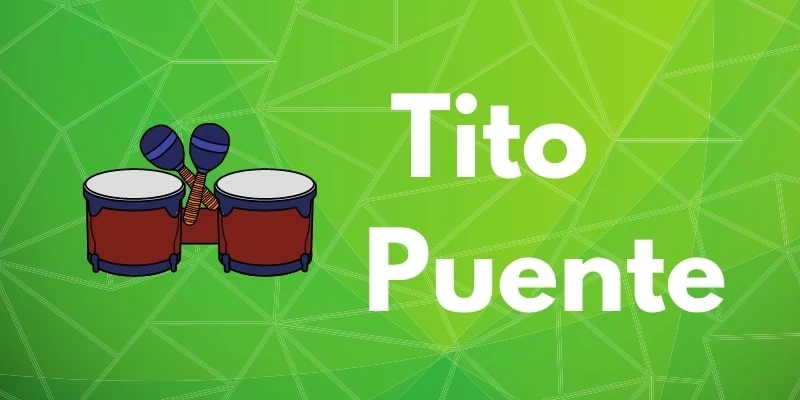Interviews with OPOL Families, Part 2
Inside: 4 families share how they use the OPOL (one parent one language) system in raising their bilingual kids.
Welcome to part two in our series interviewing OPOL families!
In Part 1, we met five families raising kids in Spanish and English. Today we get ta peek into the homes of four more Spanish and English speaking families, all using the one parent, one language approach.
Be sure to bookmark our other interviews with more multilingual families to read later:

Related: How 5 Families Successfully Raised Bilingual Kids
Here are the prompts each family responded to (you can click on the title to jump to that section of the interview):
- Please introduce yourself and your OPOL family.
- What does language look like in your home and what guidelines have you set up?
- What challenges have you faced with OPOL?
- Where/how do you feel you have been most successful?
- What resources have helped you?
- What is your best advice to other families wanting to raise bilingual kids?
Let’s hear from our Spanglish families!
MEET OUR OPOL FAMILIES
Spanish Mama: Please introduce yourself and your family.
Andrea: My name is Andrea Hamilton and my husband and I have three teenagers ages 17, 15 and 13 who we have raised bilingually since birth. When my oldest was born, the only thing I knew that I wanted to do as a parent was raise my children bilingually as I had been. My mother is from Mexico City and my dad, although being raised in Minnesota was also fluent in Spanish, so my first language was Spanish. My husband is only English speaking but has been supportive from the very beginning.
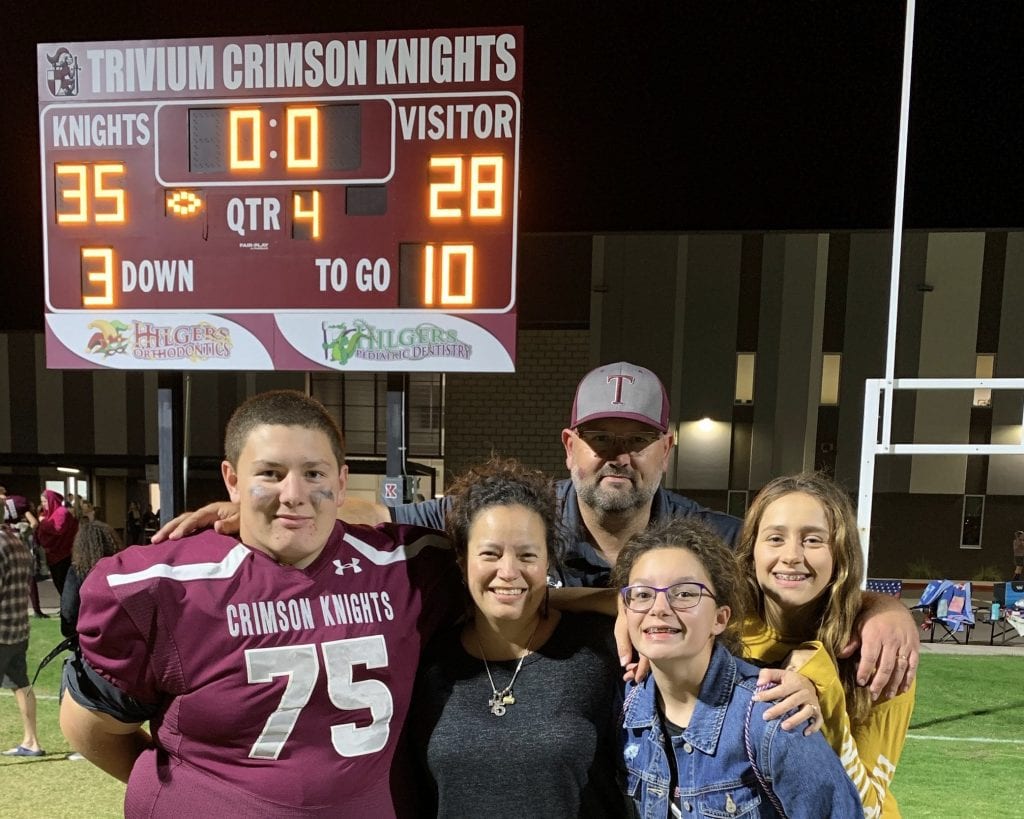
Andrea’s Family
Elisa: I am originally from S. Paulo, Brazil and live in Hawaii since 1990. My husband is part Hawaiian and we have a 15 years old girl. I am a Spanish high school teacher and my husband an architect.
Marisol: Hello! My name is Marisol, I am from Mexico but have lived in the United States since I was very young. My husband is from Germany and moved here at 19 for college. We have two daughters ages 7 and 5. We live in Texas currently.
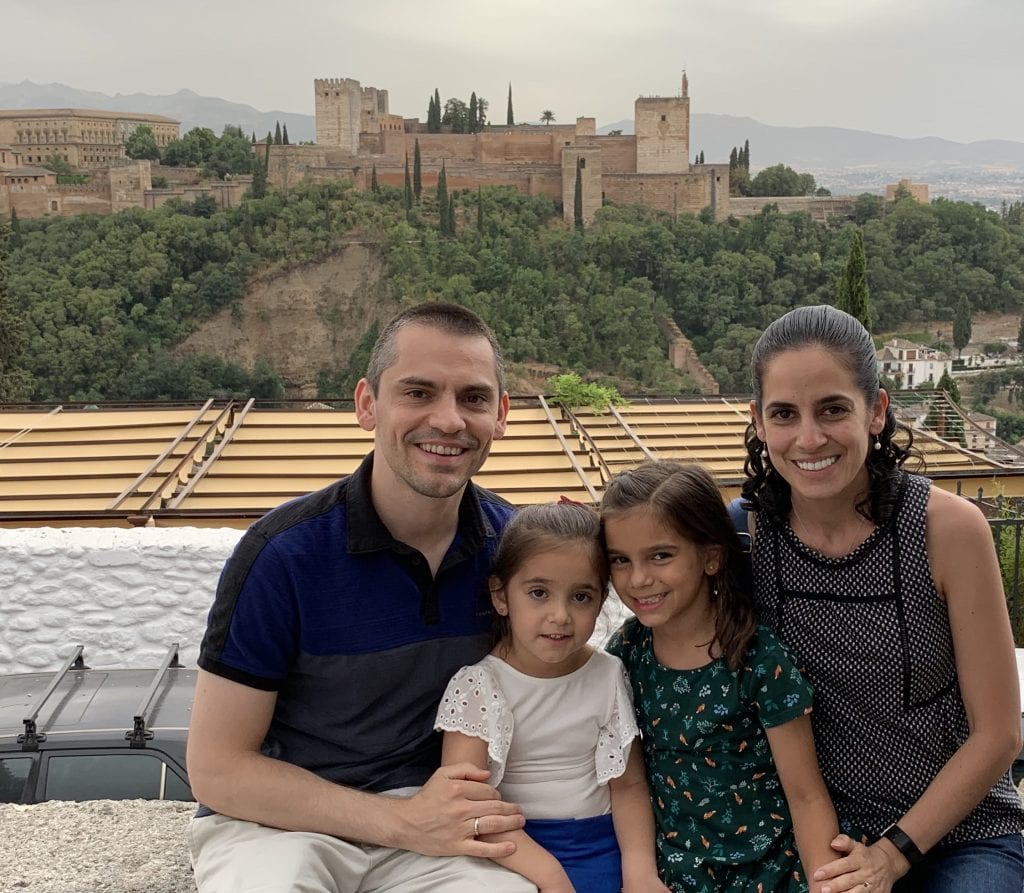
Marisol’s Family
Rebecca: Hello! My name is Rebecca. My husband, Scott, and I have an almost-two-year old, Dorothy, who is learning to speak both Spanish and English. She was born with a rare disease called phenylketonuria (PKU) for which there is no cure. In addition to having a rare disease, she is “wonderfully rare” in several other ways, including her beautiful strawberry blonde hair, her penchant for Spanish, and her already evident effervescent spirit that loves to praise the LORD. You can find us on Instagram as @wonderfullyrare (though admittedly I am just beginning to add content that addresses (a) her diagnosis and treatment, (b) bilingualism, and (c) the hope we have in Jesus Christ).
I grew up in Miami, Florida and learned to love Spanish as a young child. While both my parents spoke some Spanish, they had also both passed away before I graduated high school, with the effect that I finished high school in the Triad of North Carolina. Still loving Spanish, I decided to major in Spanish at the University of Richmond and earned my K-12 ESL teaching certificate. I have used what I learned from earning that certificate in my elementary education classrooms and now in the courses I teach on language and literacy development and instruction to pre-service and in-service teachers at a university in western North Carolina.
I always knew that giving my future children the gift of bilingualism was something I wanted to do. While my husband speaks some basic Spanish, he is not fluent. Nevertheless, he is a great advocate and very encouraging in our goal of teaching Dorothy both Spanish and English.
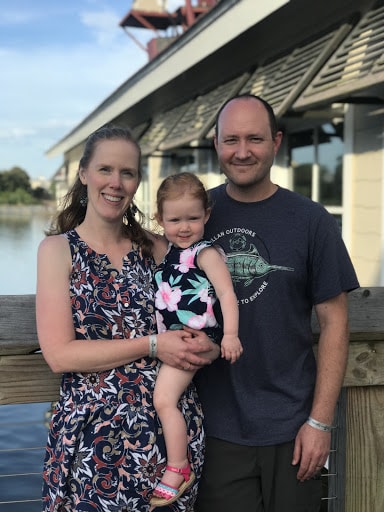
Rebecca’s Family
THE SPANGLISH MIX
Spanish Mama: What does language look like in your OPOL home and what guidelines have you set up?
Andrea: I knew that the likelihood of my children being truly bilingual was a long shot, but I dedicated myself to speaking to them in Spanish mainly so that when we would be with my family and both languages were flying back and forth, they would understand and I wouldn’t have to spend my time translating. If they went on to use Spanish to some degree as they got older, bonus! If not, they would at least have a working knowledge to bond them to their family. I try to speak to my children mostly in Spanish and when I catch myself speaking in English, I switch! If I say something in English and my kids don’t hear me, I repeat myself in Spanish and they don’t notice at all! My husband has always spoken to them in English, although has picked up Spanish words and phrases along the way that he will occasionally use with them.
Elisa: I have never been laid back at all. I believe that raising a bilingual child requires discipline and perseverance. I only speak Portuguese with my child. To date, I am constantly reminding her to respond in Portuguese only. I only text in Portuguese and she helps me to correct my student’s Spanish work sometimes. We watch movies and listen to music in Portuguese and Spanish. My husband used to complain a lot that he could not understand us but he got used to it and now he is proud that she is fluent in both languages.
Marisol: Since before our kids were born, we decided I would speak only Spanish to the kids and my husband would speak only German to them. Between him and I, we speak English because it was our common language when we met, but have since learned each other’s language. This approach has worked very well for us. We are very strict when it comes to speaking our language to the kids. No matter where we are or who is around, we speak our language to them. We also are strict on the language of any media they watch. It must all be in either Spanish or German since we are currently living in an English-speaking country.
Rebecca: While I would say our general approach is more laid back (at least at this time as she is learning the basics of communication), we do try to follow some basic guidelines. When she and I are alone, I almost exclusively speak Spanish to her. When the three of us are together, I generally translate myself by first speaking in Spanish and then repeating myself in English. My husband uses what Spanish he can (and, as a side note, I think his Spanish is expanding as well). For example, he will tell her to “siéntate” or “abre la boca.” While she doesn’t get much Kindle time given her age, I do try to keep her video watching to Spanish language videos so she can get language input from native speakers. I have also found a few good apps to support her Spanish learning as well. For example, my favorite, Endless Spanish, has a Spanish immersion setting and works on both her Spanish language and fine motor skills by dragging Spanish letters and phrases to their outline and then offers her a short cartoon that illustrates the meaning of the word and phrases she just matched.
CHALLENGES FOR OPOL FAMILIES
Spanish Mama: What challenges have you faced?
Andrea: It is really hard to keep with Spanish as my English has definitely over taken my Spanish. I majored in Spanish in college and have used it in all of my jobs since (I count the 8 years as a stay at home mom as one of my main jobs where I used Spanish!) But even with that, I mainly only have my children I speak to and not much of a community where I have Spanish conversations with other adults. However, despite the lack of outside practice, my children always understand me, despite that they usually answer me in English. Sometimes they will surprise me when I get stuck in Spanish, even though they haven’t said a word in Spanish in months, without missing a beat, they give me the Spanish word I am looking for. As they have started taking high school Spanish, they have started more and more to respond to me in Spanish and have thanked me for teaching them Spanish as it makes at least one class easier for them.
Elisa: I believe it requires hard work from the parents, it is easy to let go and allow the child to understand only but not speak. I have many friends who are “laid back” and now their children do not speak their parent’s language. Sometimes it is difficult when people are around and they have no idea what we are talking about but I had to create a habit to use one language with her.
Marisol: Our first daughter had no issues picking up both languages at home and would respond in the language she was spoken to. We sent her to preschool at 1.5 yrs old so that she could start learning English. She learned it quickly but it was still her weakest language, although it did not worry us. With our second daughter it has been a little bit different. She prefers Spanish over the other two languages and for the first 3 years only spoke Spanish to everyone no matter what language was spoken to her. She understood German and English but would respond in Spanish. We didn’t do anything different with her, but she did have more Spanish speakers at home since our older daughter also spoke to her and she chose to speak Spanish to her. We didn’t try to sway her either way and just let her choose what language to speak to her. The kids have always spoken to each other in Spanish to this day at 7 and 5 years old. Our 5 year started speaking more English and German around 4 years old and is doing well.
Rebecca: The largest challenge that we face is that we are the only Spanish speakers in our family. When we are with family, we only speak English to avoid anyone feeling awkward or left out. While they are supportive of her learning Spanish, there are also certain etiquette rules that must be followed in those situations. As she grows, I hope we can develop a network of other children her age with whom she can also speak Spanish. She has not yet entered daycare or preschool, but I am hoping she can attend a dual language school when she does go.
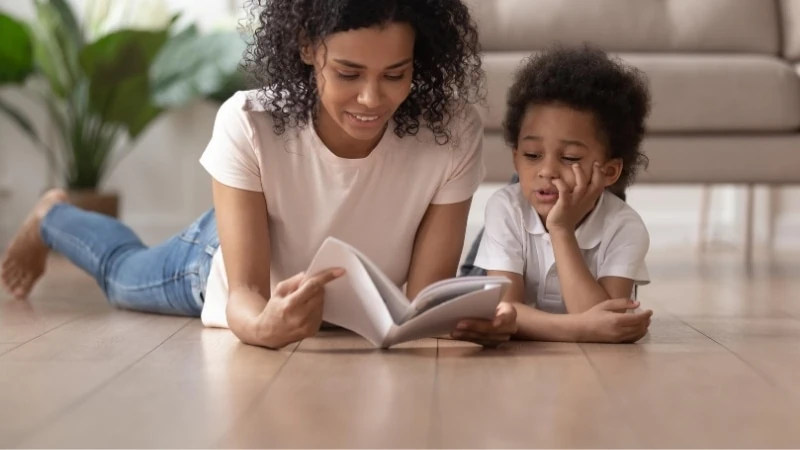
SPANISH SUCCESSES
Spanish Mama: Where/how do you feel you have been most successful in your OPOL approach?
Andrea: I feel I set the bar low for myself in terms of raising bilingual children, but I didn’t want to push Spanish on them and make it a requirement. However, I also wasn’t about to spend lots of time translating for them around my family. So, I feel that I accomplished my goal as they converse freely with my family understanding everything in Spanish and even answering some in Spanish. It isn’t foreign to them, it is a part of them, which is what Spanish is for me and what I wanted to pass on to them that was something truly and specifically from me.
Elisa: Maybe the culture, both my mother and I try very hard to show the positive side of Brazilian culture and every 2 years we travel to Brazil. I usually leave my child playing with her cousins and take her to traditional parties, dances, music, theater so she can appreciate our culture and make a better effort to speak the language with no accent. I have many friends with children that have a negative view of their parent’s culture (including students). I always remind my students who do not speak their parents language that they may miss the friendship of cool cousins and friends.
Marisol: I personally think that being consistent with speaking our languages helped a lot. For example, when our younger daughter would speak to my husband in Spanish he never deviated and always replied in German. I have seen a lot of people that just switch to the language the child speaks to them, if they speak it too, and then the child never learns that other language. I could see why they do it, and I don’t judge them because it is a bit awkward to respond in a different language, but if it is really important to you that they learn the language, I think you MUST keep speaking it. Especially if you see they understand you.
Rebecca: Since she is not yet two years old and is just learning language in general, I feel like her equal ability to understand and follow directions in both languages is our greatest success!
JOIN THE EMAIL COURSE & GET YOUR FREE EBOOK!
RESOURCES FOR BILINGUAL KIDS
Spanish Mama: What resources have helped you?
Andrea: When they were little, I always read and sang to my kids in Spanish. 17 years ago there were no bilingual mom blogs, but there were popular children’s books translated into Spanish that I read to them and I sang the songs in Spanish that were sung to me when I was a child. My husband has always been supportive which has been a huge help. He never made me feel like I should be using more English.
Elisa: As I mentioned before, my mother helps me a lot so when my daughter was a toddler, my mother sent videos, movies, children books in Portuguese. In my car, there were only Brazilian cds to sing along. Also, I would choose playdates with other children that spoke Portugueses or Spanish so she could have friends at her age who were bilingual too. Most of her neighbors and school buddies would speak English so I had to make an effort to buddy her with bilingual kids.
Marisol: I joined several raising multilingual kids Facebook groups that were helpful. Also, we live in a diverse city so we were able to find a bilingual (Spanish/English) school and a German Saturday school as well. It helps for the kids to see they are not the only ones speaking another language. We also travel to our countries with the kids and keep in touch with family.
Rebecca: SpanishMama has been a great resource to get a better feel on who we are and what our personal goals are and how those coincide with and diverge from other families.Spanish language books (particularly those that were originally published in Spanish) have been our favorite resource for expanding vocabulary and just enjoying storytime. We are set to receive our first HolaAmigo box this evening and we have high hopes for the toddler box. We’d be happy to update once we have opened and enjoyed!
ADVICE FOR OTHER OPOL FAMILIES
Spanish Mama: What is your best advice to other families thinking of raising bilingual kids?
Martha: Don’t give up and be as consistent as possible. It’s hard work but so worth it. Stick to your guns. The community language will just naturally happen and it WILL surpass the secondary language at some point. Little kids are sponges. The younger you start the better. Prepare yourself while you’re pregnant if you can. I used to listen to kids music in Spanish just so I could learn them and be able to sing them to my daughter when she was born.
Andrea: My greatest advice is KEEP AT IT! Even when it feels like you are making little to no progress. Every little word you use, they are hearing and it will all add up. Feel free to switch languages mid sentence or repeat yourself in the other language. Kids are sponges and will soak it up. I wasn’t sure that all the Spanish I was using was working, but I have found that it has made a huge difference. My nieces and nephews don’t understand let alone speak any Spanish despite the fact that my brothers were raised bilingually like I was. They just have never spoken Spanish at home, so they never learned it. I am so glad I have put the work in that I have and have given my children this gift that only I could have given them. It will be worth it!!!
Elisa: Do not expect your children to learn “naturally” without your effort. My friends who did not make an effort and expected their children to learn “naturally” without any expectation ended up with English speaking children.
It is work because children have a tendency to speak the language of their peers so parents have to be persuasive and create an environment where their language (or any language they will teach) will be attractive, interesting and desirable for the child to respond. It is the same for our students.
Marisol: I feel it has helped a lot that my husband and I speak each other’s languages. I have heard of other families having a hard time since they don’t understand what their partner or kids are saying. However, I also learned a lot of German just hearing it all day and my husband learned Spanish this way too. I would try to start learning your partner’s language if you don’t know it, but also know that you will learn a lot along with the kids. This makes family time and conversations run much smoother. Everyone is speaking their language but everyone understands everything.
Rebecca: The best advice I have for other families, particularly those like us who have non-native, and one non-fluent, parents wanting to give their child(ren) the gift of bilingualism is to simply step into it in faith. Begin by saying what you are able to say to your child and then surround them by as many sources of Spanish-language input and opportunities for output as possible, e.g., books, videos, apps, television shows, Spanish storytime at the library. Any little bit of multilingualism you can give your child will be a blessing to them!
MIL GRACIAS to the wonderful families who contributed to this post!
It’s such an honor to get a peek into how other families are making the bilingual connection happen.
